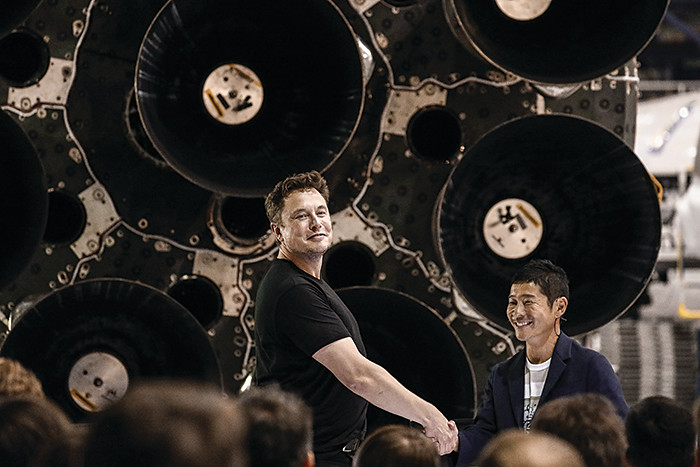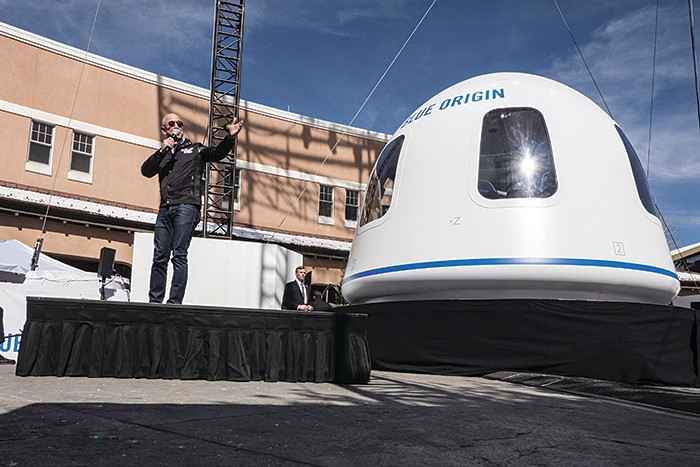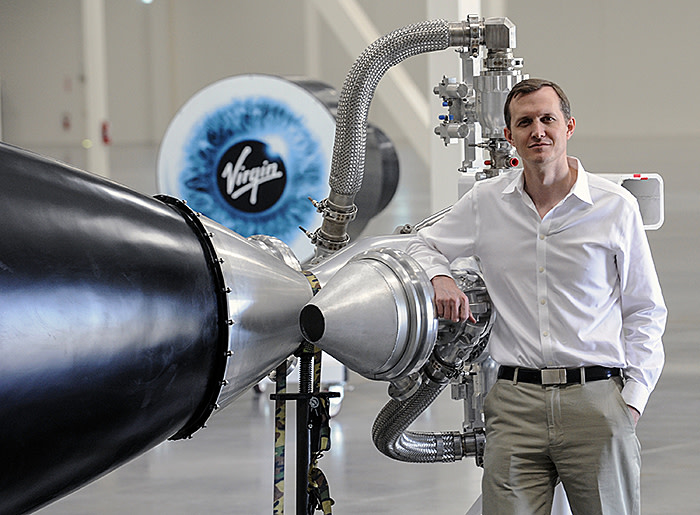The ultimate high-flyers: The ultra-wealthy planning to be the first tourists in space

Roula Khalaf, Editor of the FT, selects her favourite stories in this weekly newsletter.
Per Wimmer, a Danish financier in his fifties, will shortly be buckling his seatbelt for takeoff. Unlike the other expensive flights he has taken in his career, the champagne is likely to be served straight out of the bottle. The cost of the flight is also on the steep side, at $250,000 per ticket. But this flight comes with a difference: once the seatbelt sign has been switched off, Wimmer will be able to float over to the window. For this is a trip into space.
The entire trip will take only two hours but will, literally, be out of this world. The experience will revolve around the view of planet Earth from the floor-to-ceiling windows. Once the ship reaches 62 miles above the Earth’s surface, passengers can experience zero gravity for a few minutes before the spacecraft re-enters the atmosphere, finally landing smoothly back on the ground.
Space tourism, likely to be enjoyed initially only by the extremely wealthy, is getting closer. The race between companies planning to send tourists into orbit, such as Blue Origin and SpaceX, is heating up after Sir Richard Branson, the Virgin Group founder, said in October that his Virgin Galactic company would launch a spacecraft “within weeks” — though this will not be a tourist flight; that is expected a few months later.
Sir Richard, who has undergone astronaut, fitness and centrifuge training in recent months, says his space project is “tantalisingly close”. He says: “Ever since I watched the first Moon landings nearly 50 years ago, I’ve dreamt of flying to space myself and opening up the wonderful experience to thousands of others.”
While the $250,000 price tag puts space travel out of reach for many, Sir Richard says the cost will slowly decrease as the company expands its fleet of spaceships and ports. He hopes that over the next decade the price could fall as low as $40,000.

Virgin has built up what it calls a community of “future astronauts” over the years — people who have forked out for an as yet mythical ticket for a flight into space — and it gathers these people together for events. George Whitesides, chief executive of Virgin Galactic and one of the founder members of this unusual tourist community, says: “It’s like a special club for people who are passionate about space.”
Virgin is helped in this endeavour by a growing appetite among the world’s ultra-rich for unique experiences rather than objects. Space travel is the new power yacht.
One of the members of this community is Wimmer. “I am a pioneer, I like doing things for the first time,” says the Dane, who owns and runs Wimmer family office as well as his own investment bank, and has travelled to more than 70 countries.
Wimmer notes that he has also been diving with sharks in Fiji and set a world record by executing the world’s first tandem skydive above Mount Everest. “I want to write the manual rather than follow it. And that’s why I want to be the first European [tourist] in space.”
He has not been put off by the disasters and setbacks faced by Virgin Galactic, paying in 2004 to join the company’s first flight into space. “When I first bought my ticket, 14 years ago, I thought I would be in space a couple of years later, but I am a patient guy and understand the importance of waiting until all the tests have been done,” says Wimmer, who has undergone centrifuge training in Russia and the US.

“I anticipate that going up into space will be a life-changing experience and hope it will be a psychological journey for me as well as an amazing trip. I’m hoping that the experience will encourage me to focus on the bigger picture rather than worry about the little things in life.”
Another ticket holder, a financier in his 60s who asked to remain anonymous, says: “I am at heart an adventurer and I have always been interested in space. So when the possibility came up with Virgin Galactic, I was one of the first to enquire. I took time to research the riskiness of the flight, creating a spreadsheet with the different variables and speaking to a number of experts, before deciding to sign up.”
About 600 people, including celebrities such as Katy Perry, Brad Pitt, Tom Hanks and Leonardo DiCaprio have already reserved a seat on one of Virgin Galactic’s first flights. There is no set date for the inaugural flight, but it is now expected to be within the next few months. Once the flights are operational, customers will receive three days of training to prepare, according to Whitesides. Meanwhile, a bottle has been designed by Mumm Champagne to allow wealthy tourists travelling in space to drink fizz in zero gravity. The champagne in the top part of the bottle is controlled by a finger valve that people can squeeze when they want to release a drop. Drinkers then scoop the wine out of the air with a glass.

Space leisure travel has not been without its problems. Founded in 2004, Virgin Galactic has been busy signing up tourists, but it has yet to travel into space, despite Sir Richard’s repeated promises that the first flight was near. On numerous occasions the company has announced and delayed potential launch dates. VSS Unity, the group’s latest model, replaces the craft lost after the 2014 fatal crash in which Virgin Galactic’s first SpaceShipTwo broke apart in mid-air, killing one of two test pilots.
Whitesides said that while everyone wants to fly to space as quickly as possible, the team remains diligent, thorough and focused on all aspects of testing, from ground tests, simulator training and data analysis to ensure the highest levels of space readiness and safety.
Virgin Galactic is not the only organisation that wants to meet the demand. Jeff Bezos’ Blue Origins company said in April that it still hoped to send tourists into space by the end of the year. The company declined to comment when questioned in October on its timescale.
Elon Musk’s SpaceX has also announced plans to send a passenger around the Moon in 2023. Billionaire Yusaku Maezawa, the founder of the online Japanese clothing company Zozo, has put down a deposit for a flight aboard SpaceX’s next-generation rocket, the BFR, a spacecraft that Musk says will one day make regular trips to and from Mars. Maezawa hit the headlines earlier this year with his plans to go to the Moon with artists as part of a project he is calling #DearMoon.

Aside from the three big offerings, there are more moderately priced experiences around, such as a Russian product, marketed by the space tourism company Incredible Adventures.
For about $3,000, tourists can go up in a plane and experience zero gravity, simulated by the aircraft making a series of parabolic manoeuvres.
Space tourism is tapping into a growing trend among the global super-rich: a desire for experiences and authenticity.
Research conducted by ReD Associates suggests this demographic want to experience things that enhance them as an individual.
Charlotte Vangsgaard, partner at ReD Associates, a consultancy, says: “Wealthy people want to contribute to building their own personal narrative.” That does not mean buying any old experience that costs a lot of money, she adds.
“It’s one that you’re proud to talk about, so not the champagne on a yacht,” she says. “The ultra-wealthy are looking for new ways to show status and class and are not just relying on the traditional symbols of wealth, such as luxury goods, furniture or fashion.”
She has received enquiries about space travel from her clients, noting: “Space tourism might be thought of as one of the ultimate experiential aspirations. It’s like climbing Everest, taking you to absolute limits of human exploration and endurance. It’s not just a marker of financial resource or a luxury lifestyle, it shows your own physical stamina and courage. And it’s a highly exclusive experience that offers membership to a unique club of fellow travellers and aspirants — an allure that Sir Richard and other space entrepreneurs have already shown the potential of tapping into.”
Ten Lifestyle Group, a concierge service for the wealthy and mass affluent, says it has seen a trend in members looking for experience-based, authentic and unique holidays over more traditional ones. That has included queries about space travel, according to Stevie Piper at Ten Lifestyle Group.

Mark Stephens, a partner at law firm Howard Kennedy, says he has talked to clients who are keen to go into space. “Having already holidayed in Antarctica and in submarines at the bottom of oceans, these ultra-wealthy individuals feel like they have reached the limits of new experiences on Earth and are looking for a completely new adventure that others haven’t done. They are also attracted to the fact that it is also a real test of the individual: are they fit and able to take on the challenge?”
On the flip side, says Stephens, are the considerations around risk and reward. “The question of safety on these expeditions is paramount, clearly. But there are also more fundamental questions about the sense of reward from such an expense and whether actually they would gain more satisfaction in the long term seeing that money used for philanthropic projects that have lasting impact.”
Private banks also expect interest in the space sector among wealthy clients to grow.
Quentin Marshall, head of Weatherbys private bank in London, says: “We’ve yet to be asked to finance a trip to space but, no doubt, it won’t be long.”
While Anthony Ward, wealth planner at Barclays, has not heard of a client planning for the life goal of buying a ticket into space, he says: “It’s likely to be like Concorde. Enormous interest at the start that doesn’t necessarily translate into someone’s life goals, then once the technology is proven and the flights become more regular, more and more people add it to their bucket list. Obviously, the sooner they add it to the list the more likely they are to achieve their goal.”
For the world’s wealthiest people, even the sky is no longer the limit.
Comments